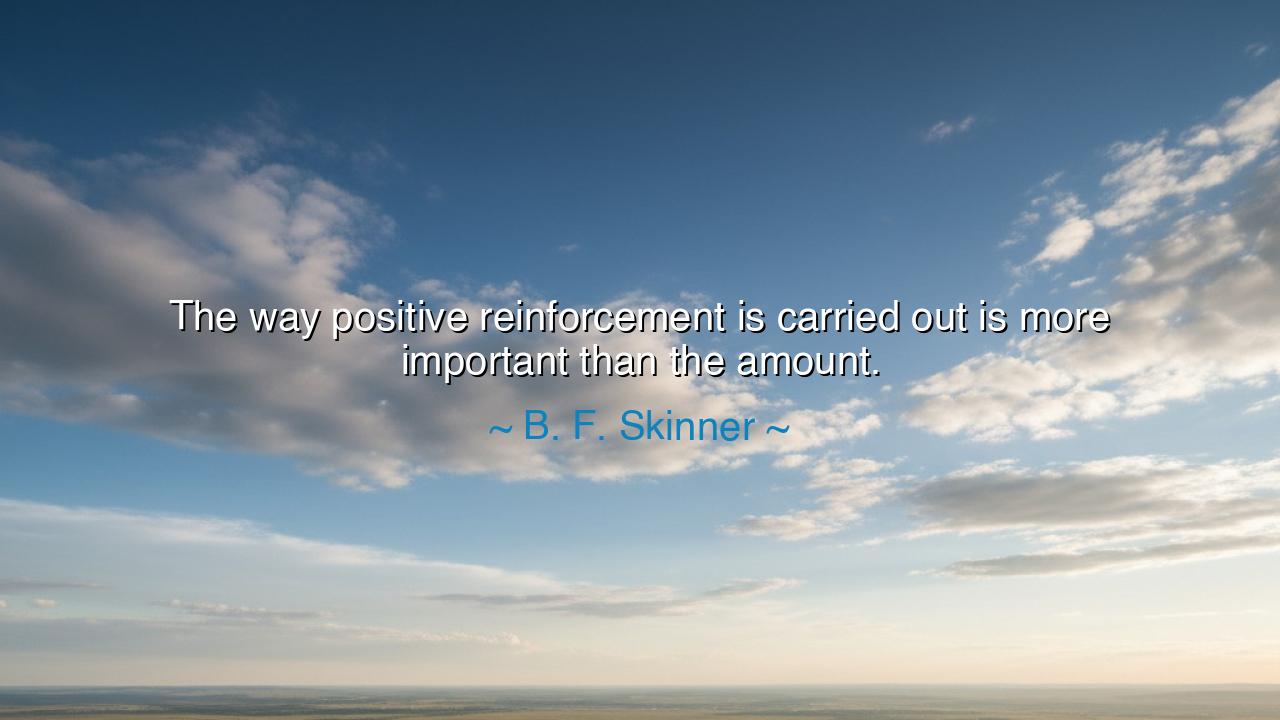
The way positive reinforcement is carried out is more important






Hear, O children of understanding, the words of B. F. Skinner, master of human behavior and observer of the hidden laws of learning, who declared: “The way positive reinforcement is carried out is more important than the amount.” This is not a casual reflection, but a principle born of deep study and observation. For in the realm of guiding others—be they children, students, workers, or even entire nations—it is not the abundance of praise or reward that shapes destiny, but the manner in which such encouragement is bestowed.
The meaning of this teaching lies in the truth that the heart responds more to sincerity than to quantity. A single word spoken with authenticity may nourish the spirit more than a thousand empty compliments. The way of reinforcement—timely, genuine, and aligned with truth—can awaken growth and inspire perseverance. But if it is careless, shallow, or mechanical, even endless rewards will lose their power. Thus, Skinner reminds us that it is not the measure, but the method, that makes the difference.
The origin of this wisdom comes from Skinner’s life’s work in psychology and education. He studied how animals and humans learn, and he discovered that behavior flourishes when reinforced, but only when the reinforcement is meaningful and well-placed. From these studies he revealed what the ancients already intuited: that the soul longs not merely for gain, but for acknowledgment that resonates with truth. In his words, we hear an echo of timeless wisdom: how you encourage matters more than how much you encourage.
Consider the story of Alexander the Great and his relationship with his teacher Aristotle. Aristotle did not flood the young prince with constant flattery, nor did he overwhelm him with endless praise. Instead, he carefully guided him, offering instruction and encouragement in moments that mattered most. The result was not only the education of a king, but the shaping of a world conqueror whose mind was sharpened by philosophy. It was the way Aristotle reinforced his pupil’s growth—not the sheer amount—that left its mark upon history.
Reflect also on Abraham Lincoln, who as president faced weary generals who faltered in battle. He did not simply heap praise or scorn indiscriminately, but chose his words with precision. To General Ulysses S. Grant, he once said, “I cannot spare this man; he fights.” It was a brief reinforcement, spoken at the right time, but it lifted Grant’s resolve and strengthened his reputation. The amount of praise was small, but the way it was carried out was powerful, and it altered the course of a war.
O seekers of wisdom, learn this: when you guide, when you teach, when you lead, it is not the flood of your words that matters, but their depth, timing, and truth. Empty rewards breed dependency; careless praise breeds cynicism. But authentic, well-placed reinforcement builds character, inspires loyalty, and awakens greatness. This is the law Skinner uncovered, a law not only for teachers and leaders, but for every soul who touches the life of another.
Practical wisdom calls you: do not wait to shower endless praise, but watch carefully for the moment when encouragement will take root. Speak words that are true, not hollow. Give recognition that is specific, not vague. Let your reinforcement be like rain: not in its abundance, but in its rightness—gentle when the soil is dry, steady when the roots need strength. In this way, your encouragement will not fade quickly, but will remain as nourishment for a lifetime.
Therefore, remember Skinner’s teaching: “The way positive reinforcement is carried out is more important than the amount.” Live by this truth. Let your words, your actions, your guidance be thoughtful and deliberate, so that those you encourage may grow strong in spirit. For it is not the volume of praise that changes lives, but the sincerity and wisdom with which it is given. And in this way, your influence will ripple outward, not as fleeting noise, but as lasting strength across generations.
––






DNDuy Ng
This statement prompts me to consider long-term impacts. If the method of delivering reinforcement matters more than the amount, does that mean mismanaged reinforcement could even be harmful? I also think about the balance between encouragement and autonomy: can too much focus on method inadvertently control behavior, reducing intrinsic motivation? Finally, how can this insight inform leadership, teaching, and personal relationships to create genuinely positive outcomes?
HTThi Ha Tran
I appreciate the emphasis on execution, but it raises a practical question: what constitutes an effective approach to positive reinforcement? Is it about empathy, clarity, timing, or perhaps a combination? I also wonder whether this principle can backfire—could overanalyzing how reinforcement is delivered make it feel forced? How do we train ourselves or others to apply reinforcement thoughtfully while maintaining authenticity?
VTHoc vo thai
Reading this, I feel intrigued by the psychological implications. Does this suggest that excessive praise might be less effective if it’s poorly communicated or insincere? I also question how cultural norms influence perceptions of reinforcement: does the same approach work universally, or must the method be adapted to individual preferences and sensitivities? How can one ensure that positive reinforcement truly motivates rather than becoming background noise?
TNLam Thao Nguyen
This quote makes me think about the nuance in giving feedback or encouragement. Is it more about timing, sincerity, or context than sheer frequency or magnitude? I also wonder how this principle applies to different settings—like parenting, education, or workplace environments. Can small, well-delivered affirmations have a stronger effect than grand gestures that feel superficial? How do we measure the quality of reinforcement versus the quantity?